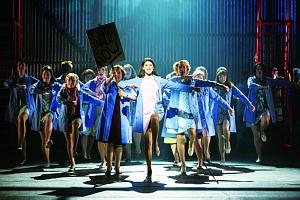Made In Dagenham - The Musical
Billy Elliot is currently in its 10th year at the West End's Victoria Palace Theatre, and now for the first time since it opened, we have a new British musical that sets a direct challenge to it. Like Billy Elliot, Made in Dagenham is based on a hit film (in this case, from 2010), and also revolves around an industrial dispute.
But instead of pulling a community apart, as the protracted and divisive miners' strike did, the events here pulled one together, and the musical gives fresh, fierce and individual voice to the women sewing machinists who went out on strike at the Ford production plant in Dagenham in 1968. They had been summarily downgraded to unskilled category B workers, which also meant that they were paid less than their male counterparts (who made up the majority of the plant's workforce) in category C.
It's a heartwarming story, and the joy of Richard Bean's book is that it neither patronises nor glamorises; it portrays the women with remorseless resilience yet unerring humour. That's one of Bean's trademarks, of course; he knows how to bring out the wit of any situation. But he also knows how to supply the necessary grit, too.
He is joined in his skilful art by lyricist Richard Thomas, who provides some of the British musical theatre's funniest lyrics since Jerry Springer — the Opera over here (or The Book of Mormon in New York). Though film and TV composer David Arnold doesn't provide tunes that equal the dexterity or memorability of the words they accompany, it is appropriately in period.
That period feeling of the 60s is also beautifully summonsed in the work of designer Bunny Christie and choreographer Aletta Collins, with a brightly cheerful and cheeky wit of its own. Director Rupert Goold holds the complex edifice afloat, pacing it perfectly so that even if it is ultimately a little overlong, it keeps you gripped throughout.
That's also thanks to the sterling efforts of a company who find all the comic rhythms and emotional resonances of every moment; it is everything that the ill-fated I Can't Sing! that started the year in the West End tried but failed to do. It is an interesting coincidence that the lead producer of both shows is Stage Entertainment. Perhaps they've learnt a lesson from that show; both may be based on real-life characters (and just as Simon Cowell took an onstage bow on the first night of I Can't Sing!, so did the real Dagenham women here), but whereas one sought only to send-up and caricature them, this one establishes real emotional connections to them.
It is led by a glowingly lovely performance from Gemma Arterton as machinist-turned-agitator Rita O'Grady, with Adrian Der Gregorian superb as her husband Eddie: a leading man cast from an authentic place. Terrific work, too, comes from Sophie Stanton, Isla Blair, Sophie-Louise Dann, Mark Hadfield, Steve Furst and David Cardy, amongst a superb ensemble.
British musicals have been in the doldrums for a while now — as well as I Can't Sing!, there was also the early closures of Andrew Lloyd Webber's Stephen Ward and Tim Rice's From Here to Eternity. At last we have an original new show worth celebrating.
"But like the cause of equal pay itself, there's an air of unfinished business about it all. Despite celebrating how a bunch of workers found their voice, the evening lacks a truly compelling one of its own."
Dominic Cavendish for The Telegraph
"This show - with its slick, catchy tunes ... infectiously demonstrates that it's a saga well worth making a song and dance about."
Paul Taylor for The Independent
"Turned into a big, brassy musical, the show has mislaid the quality that made the film so good: a real heart."
Michael Billington for The Guardian
"With its feel-good approach to a long-won battle for fairness, this show will win plenty of friends out for an evening's easy entertainment."
Quentin Letts for The Daily Mail
"... a funny, thoughtful and uplifting show that deserves to be seen."
Simon Edge for The Daily Express
"Made in Dagenham is broad, occasionally crass and a little too manipulative (the final number is an especially brazen bid to get us on our feet). But it also manages to be robustly likeable — mixing passionate populism with bursts of big-budget flamboyance."
Henry Hitchings for the Evening Standard
External links to full reviews from popular press
The Telegraph - The Independent - The Guardian
Originally published on
